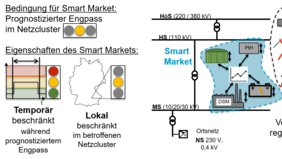The joint project "EOM-Plus" was officially launched with a one-day online workshop in the circle of the joint partners, the project advisory board and the Project Management Jülich. In the project, the Technische Hochschule Ingolstadt (THI), the Friedrich-Alexander University Erlangen-Nuremberg (FAU) and the Foundation for Environmental Energy Law from Würzburg will investigate the short and medium-term effects of a nationwide implementation of market-based bottleneck instruments over the next three years. The aim is to investigate the extent to which a smart, i.e. intelligent, congestion management system can be used to integrate the increasing volumes of electricity from renewable energy sources (RES) into the supply system at low cost.
These considerations are based on the assumption that a market-economy organisation of congestion management can generate corresponding innovations and activities in order to efficiently manage electricity grid bottlenecks from a total cost perspective. In these considerations, the so-called Smart Markets act as regionally and temporarily restricted markets for flexibility, especially at distribution network level. Their activity is thus based on signals regarding predicted electricity grid bottlenecks. Within the framework of "EOM-Plus", various forms of these Smart Markets and their respective embedding in the current market design are to be conceptually developed and extensively analysed.
The "EOM-Plus" research project thus addresses central energy policy issues concerning the cost-optimal integration of renewable energy expansion, market-based congestion management and new business areas for flexible capacities (generators, loads, storage). The research work therefore focuses on the possible total costs of a nationwide implementation of the Smart Market approach and on their cost saving potentials in the overall system compared to the existing mechanisms of congestion management. In this context, different scenarios for increasing the share of RES and grid expansion are considered. The project leader Prof. Dr. Veronika Grimm (FAU) and Prof. Dr. Uwe Holzhammer (THI) are also interested in the regional steering effect of Smart Markets for the operation of plants and for investments in climate-friendly, flexible generation and storage capacities, as well as their possibilities to limit the grid expansion to a necessary extent. The results will thus also shed light on the need for grid expansion under different framework conditions. The focus will also be on the problem of strategic bidding behaviour of players in the Smart Market or between different sub-markets and the resulting need to adapt the regulatory framework.
The presentation of the current project approach at the virtual project kick-off met with great interest and approval by the experts from the field and led to extremely constructive discussions. The project advisory board includes the two cooperation associations of energy suppliers Trianel GmbH and 8KU GmbH (and their shareholders), as well as Bayernwerk AG as a large regional network operator in Bavaria. The project advisory board also provided helpful aspects at the kick-off, which strengthen the practical relevance of the project. Only in the implementation of these Smart Markets the advisory board currently sees major obstacles in the regulatory framework. The removal of existing obstacles is specifically addressed in the work package for the implementation of the Smart Market approach in practice. From a technical point of view, the advisory board considers the potential participation of existing flexibility in the distribution network to be possible even now.
With the research project "EOM-Plus" the research activities of the team around Prof. Holzhammer from the Institute of new Energy Systems at THI are intensified around the topics flexibility, energy system analysis and new markets. The team of Prof. Grimm is responsible for the economic classification of the approach. The work on the regulatory framework is carried out by the Foundation for Environmental Energy Law (Stiftung Umweltenergierecht). The research activities are supported by the German Federal Ministry for Economic Affairs and Energy (BMWi) with more than 700.000 € for three years.


![[Translate to English:] Logo Akkreditierungsrat: Systemakkreditiert](/fileadmin/_processed_/2/8/csm_AR-Siegel_Systemakkreditierung_bc4ea3377d.webp)








![[Translate to English:] Logo IHK Ausbildungsbetrieb 2023](/fileadmin/_processed_/6/0/csm_IHK_Ausbildungsbetrieb_digital_2023_6850f47537.webp)


